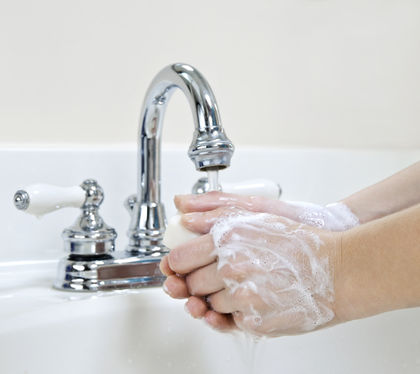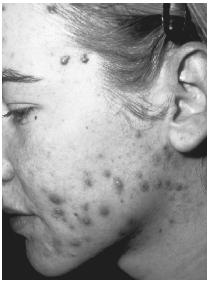Personal Care and Hygiene - Skin

Skin is the largest organ on the body. It has two layers: the thin outer layer is made up of dead skin cells that are constantly shed and replaced by new cells. The thick inner layer is made up of blood vessels, nerves, and hair follicles, which contain glands. The glands in the hair follicles produce an oily substance called sebum, which keeps the skin and hair from drying out. Daily washing will keep the skin on the face and other areas of the body clean by removing the dirt, oil, and dead cells before they can accumulate.
Puberty and Acne
Skin changes during adolescence. The onset of puberty means more hormones are produced. It is these hormones that trigger the oil glands in the hair follicles to release more sebum, which may eventually clog the small openings in the skin, called pores.
With more sebum being produced, it's possible for the hair follicles to become clogged because the oil can't escape from the pore fast enough to make room for new sebum. If sebum and dead cells collect in the hair follicle, a white-colored plug will form in the pore. With the pore plugged, the hair follicle will begin to swell and create a whitehead. Then, if the pore remains open, the surface of the pore may darken from a chemical process that occurs in the pore, thus creating a blackhead.
OVER THE COURSE OF AN AVERAGE LIFETIME, A PERSON WILL SHED ABOUT FORTY POUNDS OF SKIN.

HYGIENE THROUGH HISTORY
Though it may be hard to believe, bathing was not always considered a good practice. In fact, Saint Francis of Assisi, a Christian monk who was sainted by Pope Gregory IX in 1228, told people that they would best show their love for God by not bathing. People throughout Europe believed him and refused to bathe for any reason. In fact, Queen Isabella of Spain proudly declared that she had only bathed twice in her entire life.
It wasn't just Europeans in the Middle Ages (c. 450–1500) who refused to bathe. Early American colonists in Virginia and Pennsylvania restricted bathing as a way to outlaw any type of nudity. These laws were very strict about how often one could bathe. One law stated that anyone who bathed more than once a month would be sent to prison.
Because of these poor hygiene habits, many people died of disease. In the nineteenth century alone, millions of infant deaths were reported throughout Europe and America. The most common cause of death was infant diarrhea, which was caused by mothers who went to the bathroom, didn't wash their hands, and then passed on intestinal bacteria to their children.
It wasn't until two scientists in the late nineteenth century, Robert Koch (1843–1910) from Germany and Louis Pasteur (1822–1895) from France, discovered that bacteria were the cause of disease that the health crises began to improve. Because of their discovery, doctors and nurses began washing their hands before examining patients or performing surgery, and vaccines were developed that fought bacteria and saved the lives of millions of people.
An actual pimple is created when the wall of the hair follicle bursts, releasing sebum and dead cells into the skin and creating a bacterial infection. Pimples are actually infections and can produce red bumps that are sometimes filled with pus. If a hair follicle bursts deep under the skin, a more serious infection, called cystic acne, will occur.
In addition to puberty, acne can be hereditary, which means it's inherited from one's parents. Some mild skin problems can be cleared up with over-the-counter products, but more serious acne should be treated by a dermatologist (skin doctor).
TREATING ACNE. Treating mild acne generally involves using a product that helps reduce the amount of sebum and increases skin cell turnover. There are soaps, lotions, and creams that work to dry up oil and are available in the drugstore without a prescription.
Stronger treatment will usually require a prescription from a dermatologist. There are many prescription medicines, ranging from lotions to oral antibiotics that work to reduce the amount of bacteria in the skin. A dermatologist will determine the best one to treat individual problems. While acne cannot be cured, it can be treated successfully.
Basic Skin Care
Taking good care of the skin involves a few basic steps. Dermatologists recommend that a person wash the face two times a day with a mild soap or gentle cleanser. It is best to avoid washing too often, as the skin will become irritated and dry out. If too much of the skin's natural oil is washed away, the skin may become very dry and begin to itch and flake. Because the skin's natural process is interrupted, the skin may begin to produce more oil than usual, which can cause more breakouts.
Dermatologists also recommend the following for clean, healthy skin:
- Use lotions only if needed, and use ones that are oil-free and water-based.
- Try to identify what irritates the skin; if it's stress, try to reduce stress levels.
- Leave pimples alone; picking, popping, or squeezing them will only make them worse.
- Have only a dermatologist remove or extract pimples.
- Try to avoid touching the face.
- Keep hands clean by washing them often.
- Try to stay out of the sun, and use a sunscreen every day during summer and winter.
Sun Protection
Protecting the skin from the damaging effects of the sun's ultraviolet rays is very important. Sunscreen

not only helps prevent premature wrinkles and painful sunburns that dry out the skin, it also can help reduce the risk of developing skin cancer. It's smart to use a sunscreen with a Sun Protection Factor (SPF) of 15 or above.
Applying a sunscreen fifteen minutes before exposure will also make the product more effective. If a person is spending a lot of time out-side, it's smart to reapply sunscreen every few hours, as sweat will dilute or wash away the lotion, leaving the skin unprotected. There are also some products that work while swimming, but it's always best to reapply sunscreen after swimming as well.
ECZEMA
The medical term for eczema (pronounced EX-em-a) is dermatitis. The skin develops a rash in a specific area, such as the backs of the knees. It can be confined to a small area, but then spread to a larger area on the skin. Sometimes blisters appear that swell, ooze, and scab.
While eczema isn't caused by poor hygiene, the treatment for the skin disorder is dependent on regular cleaning with soap and water. Eczema can be caused by a number of things, including contact with certain cosmetics, jewelry, plants, skin cream, and chemicals used to make clothing.
Treatment for eczema includes avoiding contact with the irritating product, as well as cleaning the area on a regular basis. A doctor may also prescribe a cream or ointment to help relieve the itching that eczema causes.
Sunscreen should be used every day because the sun can do damage even when it's cold or cloudy outside. If sunburn does occur, wet compresses and soothing lotions can help relieve the pain. If painful blisters or swelling appears, it's best to see a doctor.

Doctors also recommend avoiding tanning salons and sunlamps as they, too, can damage the skin.
Makeup
Using makeup is a personal choice. Experimenting with makeup can be fun. However, it's important to use products that are hypoallergenic (not allergy causing) to avoid irritation. In order to reduce the risk of clogged pores or acne, it's always smart to remove makeup at the end of the day with mild soap or another gentle cleanser.
If makeup irritates the skin, it's best to stop using it immediately. Sometimes, makeup can cause allergic reactions. Dermatologists also recommend that people avoid sharing makeup as it can increase the spread of bacteria.

